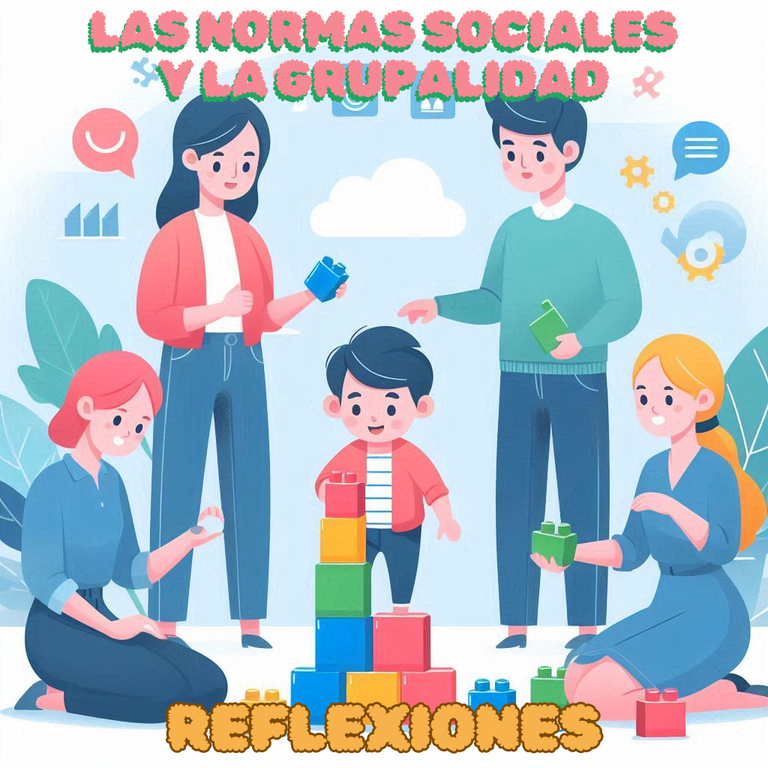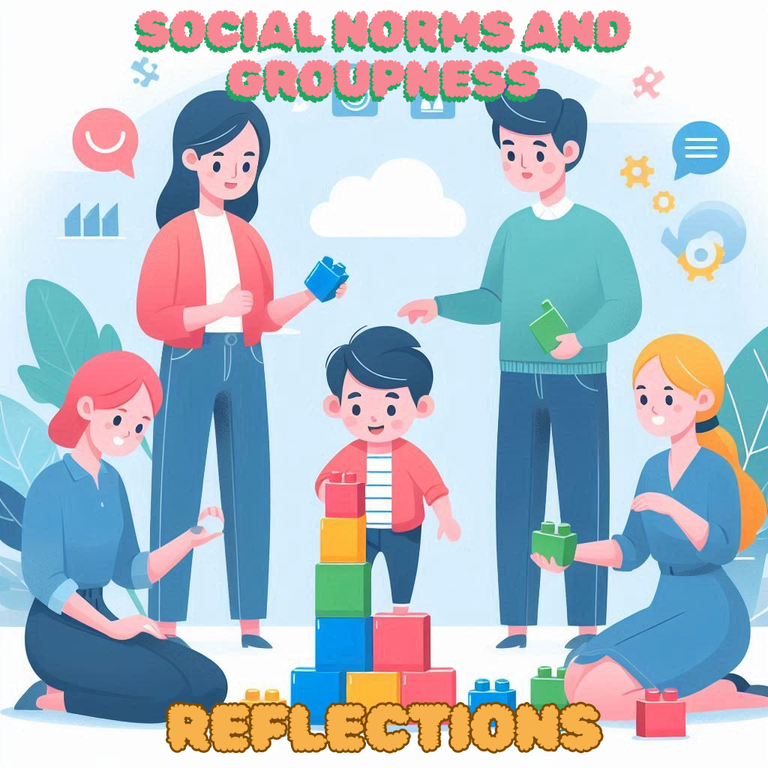
Cuando nacemos, inicia el complejo proceso de socialización que, contrario a lo que muchas personas tienen concebido, no es simplemente relacionarse con otras personas, sino hacer interno lo externo mediante la actividad y la comunicación, a medida que vamos aprehendiendo lo culturalmente heredado. Esto no es mera especulación, sino que se trata de uno de los principios de la escuela del Enfoque Histórico Cultural; escuela soviética de psicología que nos enseña, también, que es la enseñanza la que guía y conduce al desarrollo y no al revés.
En ese sentido, podemos hablar de la interiorización (otro principio) de normas y valores culturales como parte del proceso de adueñarnos de la cultura en la que nacemos. Así, durante las primeras edades, sobre todo las escolares, gracias a la importancia que se le confiere a las personas adultas significativas y la actividad de estudio cuyo principal objetivo es que los niños y las niñas se apropien de un sistema de conocimientos, habilidades y cualidades psicológico-morales, estos se van preparando para la vida en sociedad. Pero ello no queda solo ahí, sino que además, se puede observar su correlato en la actividad del juego de roles tan importante para los infantes, porque es ahí donde se manifiesta todas estar normas sociales adquiridas. Es en estas edades cuando las normas son consideradas inmutables o inviolables, pero es algo que a medida que va avanzando el desarrollo se va haciendo más flexible, y sin embargo, esas mismas normas pasarán de lo externo a lo interno, como proceso autorregulado, en la etapa de la juventud.
Esto permanece así hasta alrededor de los 9 o 10 años de edad, a partir de donde empieza a tener más relevancia el grupo de iguales o coetáneos, lo cual es bien conocido que ocurre en la etapa de la adolescencia. Por tanto, las normas empiezan a tener un matiz más grupal, con el objetivo de encajar en el grupo. A donde quiero llegar con todo este recuento del desarrollo, es que las normas sociales tienen primeramente un carácter externo en el desarrollo humano, para pasar luego a ser asumidas con más o menos crítica atendiendo a la etapa del desarrollo.
Es imposible estudiar a las personas fuera de su contexto social, y por ende, es necesario destacar que las normas no son adoptadas rígidamente por estas, sino que en cada uno de nosotros y nosotras existe un trasfondo sociohistórico que nos condiciona. Pero además, ¿qué son las normas? Las normas desde la Psicología de los grupos
...son un producto del grupo como un todo, emergen de la conducta real y, a su vez, reaccionan sobre ella. Una norma es una idea que ocupa las mentes de los miembros del grupo, idea que puede expresarse en forma de un juicio en el cual se especifique lo que los miembros (...) en determinadas circunstancias deben hacer, debieran hacer o se espera que hagan. Un juicio del tipo descrito solo constituye una norma, si cualquier desviación de la conducta real con respecto a ella es seguida por algún castigo.
En ese sentido, es necesario destacar que, aunque las normas sean consideradas como producto de un grupo, el mismo grupo al ser parte de una sociedad específica y ser reflejo de ella, pues las normas igualmente lo serán. Sin embargo, dichas normas adquirirán un significado y un sentido diferente atendiendo a las circunstancias específicas de cada grupo, lo que haría posible hablar de normas sociales y comportamiento grupal como dos caras de una misma moneda. O sea, me refiero a que el comportamiento grupal será resultante de la introyección de las normas sociales, pero no de manera pasiva, sino mediatizadas por la intersubjetividad grupal atendiendo al contexto.
Sin embargo, es posible hablar de comportamientos que se consideran contra las normas porque van contra lo socialmente aceptado o esperado ya sea de manera explícita o tácita. ¿Pero por qué alguien transgrediría las normas y se arriesgaría a sufrir un castigo, si ellas existen para regular el comportamiento colectivo? Pues precisamente porque se trata de un colectivo conformado por personas, por diferentes maneras de vivenciar la realidad. Esto quiere decir que cuando las normas no se corresponden con la realidad o cuando el castigo consiguiente es poco severo, pues se produce una brecha, un desajuste.
En ese sentido hay dos cuestiones que creo necesario destacar. Una es que no se puede decir que exista relación entre la asunción de la norma y la interiorización de la misma, o sea, que no se puede hablar de que cuando las personas cumplan las normas a cabalidad sea porque realmente las entiendan o se vean implicadas con ellas, sino que, cuando el castigo que sigue por quebrantar una norma es severo, pues cumplir la norma puede significar que las personas huyen al castigo, pero no necesariamente que estén de acuerdo con la norma o que la asuman.
La otra cuestión es que, como ya decía, las normas grupales son un reflejo de la sociedad, pero esto también quiere decir que serán producto de ella. Así, en grupos sociales en los que se privilegia y celebran los comportamientos desviados de la norma, digamos, formal o establecida, como en aquellas comunidades altamente delictivas, existirán normas propias que tendrán una prioridad mayor porque serán las que responden realmente a necesidades insatisfechas. Es por eso que no se puede hablar de crisis de valores en estas personas, sino de una escala de valores distorsionada porque ya sea robando o trabajando, sostener a la familia seguirá siendo una tarea digna.
Para terminar, es necesario tener en cuenta que el grupo representa un marco referencial para nuestras actitudes y comportamientos, pues nos condiciona e influye en nuestra percepción de la realidad. No se niega el papel activo del propio sujeto, pero se tiene en cuenta que, al ser seres sociales, los otros jugarán un papel importante en nuestra construcción de la realidad.
English version

When we are born, the complex process of socialization begins which, contrary to what many people have conceived, is not simply to relate to other people, but to make the external internal through activity and communication, as we learn what we have inherited culturally. This is not mere speculation, but it is one of the principles of the school of the Cultural Historical Approach; a Soviet school of psychology that teaches us, also, that it is the teaching that guides and leads to development and not the other way around.
In this sense, we can speak of the internalization (another principle) of cultural norms and values as part of the process of taking ownership of the culture into which we are born. Thus, during the early ages, especially at school, thanks to the importance given to significant adults and the study activity whose main objective is for children to appropriate a system of knowledge, skills and psychological-moral qualities, they are being prepared for life in society. But this is not only there, but its correlate can also be observed in the activity of role-playing, so important for infants, because it is there where all the acquired social norms are manifested. It is at this age when the norms are considered immutable or inviolable, but it is something that as development progresses becomes more flexible, and however, these same norms will pass from the external to the internal, as a self-regulated process, in the stage of youth.
This remains so until around 9 or 10 years of age, after which the peer group begins to have more relevance, which is well known to occur in the stage of adolescence. Therefore, the norms begin to have a more group nuance, with the objective of fitting into the group. What I want to get at with all this account of development is that social norms have first of all an external character in human development, and then they are assumed with more or less criticism depending on the stage of development.
It is impossible to study people outside their social context, and therefore, it is necessary to emphasize that norms are not rigidly adopted by them, but that in each of us there is a sociohistorical background that conditions us. But also, what are norms? Norms from the point of view of group psychology
...are a product of the group as a whole, they emerge from actual behavior and, in turn, react on it. A norm is an idea that occupies the minds of group members, an idea that can be expressed in the form of a judgment specifying what members (...) in certain circumstances should do, ought to do, or are expected to do. A judgment of the type described only constitutes a norm if any deviation of the actual conduct from it is followed by some punishment.
In this sense, it is necessary to emphasize that, although the norms are considered as a product of a group, the same group, being part of a specific society and being a reflection of it, the norms will also be so. However, these norms will acquire a different meaning and sense according to the specific circumstances of each group, which would make it possible to speak of social norms and group behavior as two sides of the same coin. In other words, I mean that group behavior will be the result of the introjection of social norms, but not in a passive way, but mediated by group intersubjectivity according to the context.
However, it is possible to speak of behaviors that are considered against the norms because they go against what is socially accepted or expected either explicitly or tacitly. But why would someone transgress the norms and risk punishment, if they exist to regulate collective behavior? Precisely because it is a collective made up of people, with different ways of experiencing reality. This means that when the rules do not correspond to reality or when the consequent punishment is not severe enough, there is a gap, a mismatch.
In this sense, there are two issues that I think it is necessary to highlight. One is that it cannot be said that there is a relationship between the assumption of the norm and the internalization of the same, that is, we cannot say that when people fully comply with the norms it is because they really understand them or are involved with them, but rather, when the punishment that follows for breaking a norm is severe, then complying with the norm may mean that people flee from punishment, but not necessarily that they agree with the norm or that they assume it.
The other issue is that, as I said, group norms are a reflection of society, but this also means that they will be a product of society. Thus, in social groups in which behaviors deviating from the norm are privileged and celebrated, let us say, formal or established, as in those highly criminal communities, there will be their own norms that will have a higher priority because they will be the ones that really respond to unsatisfied needs. That is why we cannot speak of a crisis of values in these people, but of a distorted scale of values because whether stealing or working, supporting the family will continue to be a worthy task.
To conclude, it is necessary to bear in mind that the group represents a referential framework for our attitudes and behaviors, since it conditions us and influences our perception of reality. The active role of the subject himself is not denied, but it is taken into account that, being social beings, others will play an important role in our construction of reality.

Créditos | Credits
Bibliografía consultada
Bello, Z. y Casales J. (2005). Psicología Social. Félix Varela.
Domínguez, L. (2007). Psicología del Desarrollo. Problemas, Principios y Categorías. Félix Varela.
Imágenes utilizadas | Images used
Todas las imágenes utilizadas son de mi propiedad y fueron generadas utilizando Copilot de Bing y editadas en Canva | All images used are my own property and were generated using Copilot from Bing and were edited using Canva.
Traducción | Translation
Te puede interesar | You may be interested in
Las personas introvertidas y otros demonios | Introverted people and other demons [ES/EN]
El amor no lo puede todo | Love can't do everything [ES/EN]
El llanto como forma de validarnos | Crying as a way to validate ourselves [ES/EN]
¿Depresión de alto funcionamiento? | High-functioning depression? [ES/EN]
Sigamos hablando del autocuidado | Let's keep talking about self-care [ES/EN]
¿Las media naranjas ruedan? | Does half oranges roll? [ES/EN]
Sígueme en mis redes sociales | Follow me on my social media platforms
Esta es una iniciativa de InLeo. Si quieres participar solo tienes que pinchar aquí para que conozcas los detalles | This is an InLeo initiative. If you want to participate, just click here for details.
Posted Using InLeo Alpha


Saludos, me gustó la manera en la cual abordaste la relación entre las normas, las grupos y las sociedades. Es un arte armonizar la comprensión interna de las normas por los sujetos y, al mismo tiempo, castigar cuando estas no son asumidas, de tal manera que no solo haya una fuerza externa que las haga cumplir, pues al final es la fuerza interior en cada sujeto lo que puede darle un sentido profundo.
!PIZZA
!KING
Exacto. Gracias por aportar su criterio.
Impressive work King @genrigp, jesusalejos(1/6) is in awe of the time and energy you put into creating this post. Your contributions to this community are invaluable.
In fact @jesusalejos has given you 0.05 SOULS! You can find it in your hive-engine wallet! We hope you enjoy it a lot!
BTW! with SOULS you can access our infernal coliseum game, conquer territories and earn rewards
$PIZZA slices delivered:
@jesusalejos(1/10) tipped @genrigp